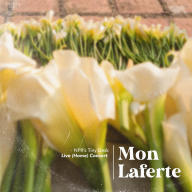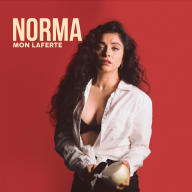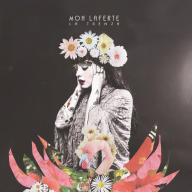Born Norma Monserrat Bustamante Laferte in Viña del Mar, she began playing guitar at age ten, entered a musical conservatory at 13, and played gigs in Valparaiso. She released her first album, 2003's La Chica de Rojo, under the name Monserrat Bustamante. During this time, she also appeared on the television series Rojo Fama Contrafama and El Baile en TVN, and in the 2006 film Rojo, La Pelicula. She began performing as Mon Laferte after moving to Mexico City in 2007, and after battling thyroid cancer in 2009, she released the album Desechable in 2011. In 2012, she appeared as a judge and mentor on the second season of Factor X, the Chilean version of The X Factor. She also joined the hard-rocking group Mystica Girls for 2012's MetalRose and 2014's Gates of Hell. Amidst all this activity, Laferte continued her solo career, issuing 2013's Tornasol and 2015's Mon Laferte, Vol. 1. On 2017's La Trenza, she collaborated with Enrique Bunbury, Juanes, and Manuel Garcia. It peaked at number 13 on the Latin Pop Albums chart. Its lead single, "Mi Buen Amor" featuring Bunbury, took home the Latin Grammy for Best Alternative Song.
During extensive touring that led her all over the globe, Laferte experienced the end of a long-term relationship. Moved by the breakup, she began writing songs based on her romantic relationships, carefully mining the details of her life. The end result, Norma, was cut live in a single day at Capitol Studios in Los Angeles. Issued in the fall of 2018, it was her first concept album and comprised ten songs, each examining a different stage of an amorous relationship in musical styles that crisscrossed cumbia, son, danzon, salsa, bolero, and bachata. Produced by Omar Rodriguez-Lopez, it was performed by 13 musicians playing live in the studio simultaneously and free of post-production overdubs.
In November of the following year, Norma won the Latin Grammy for Best Alternative Music Album. The award was overshadowed by her protest that evening: On the red carpet, Laferte opened a long black coat and exposed her breasts to photographers; written across them were the words "En Chile torturan violan y matan" ("In Chile, they torture, rape, and kill"), in reference to mass demonstrations in her home country that had begun in October to protest economic inequality and to maneuver for Civil Rights after the government increased subway fares. That same evening, she released "Plata Ta Tá," an urbano track in collaboration with Puerto Rican artist Guaynaa. In the song, she delivered the lyrics, "This generation has the revolution, with their cell phone they have more power than Donald Trump...." In another verse, Guaynaa chants, "Go out, go out/go fight, go fight/Let's make the world listen." At the end of January 2020, Laferte released the acoustic Sola con Mis Monstruos. The live set consisted of the artist delivering unplugged renditions of her best-known songs, only to close it with a cover of Edith Piaf's "La Vie en Rose." Her standalone single "Biutiful" won a Latin Grammy for Best Rock Song.
Laferte is also a visual artist. She was the subject of a solo exhibition at the national Museo de la Ciudad de Mexico that featured nearly 70 works. Due to the global COVID-19 pandemic, it closed shorty after it opened. Laferte went to Tepoztlán, 50 miles outside the city, to ride out the pandemic and decided to stay. In September she opened an art gallery, Morelos, to display her own work and that of other Mexican artists. During the late fall she saw a television documentary about the great ranchera singer Chavela Vargas, who had spent her final years in the tranquil Tepoztlán; she was deeply moved by it as her long-held admiration for Vargas is well-documented.
Laferte had been writing songs during her transition to life in Tepoztlán and the pandemic. The documentary gave her a directional focus for her next album. In January 2020, Laferte commissioned singer and songwriter Vivir Quintana to write "Canción Sin Niedo" for a performance in Mexico City as part of the Tiempo de Mujeres, Festival por la Igualdad in commemoration of International Women's Day. The song, performed as a duet between the two women, went viral before its public performance at the festival. "Canción Sin Miedo" played during the closing credits of the Netflix original documentary The Three Deaths of Marisela Escobedo, which told the tale of Marisela Escobedo Ortiz, a mother from Juárez who was murdered while seeking justice for the murder of her daughter, Rubí Frayre.
That September, she released the ranchera "Que Se Sepa Nuestro Amor," a duet with traditional singer Alejandro Fernandez, as a love letter to the Mexican people and their culture. She asked Fernandez to appear because she considers him the greatest living practitioner of Regional Mexican Music. When asked why he agreed when he so often declines, Fernandez replied that "to hear a ranchera song in a voice as passionate and unique as Mon’s does not happen every day." The black-and-white video, shot by Rodrigo Robles, also included footage of Fernandez singing his parts with an all-female mariachi band.
On two consecutive days in January 2021 Laferte released two versions of the single "Se Me Va a Quemar el Corazon"; one was delivered as a solo ranchera, the other with her fronting banda stars La Arrolladora Banda el Limón de René Camacho. A commentary on gender violence, the video featured actor Tenoch Huerta. In April she released the full-length Seis. Its songs reflected the influences of artists such as Vargas, Toña La Negra, and others, and included collaborations with Gloria Trevi and Mujeres del Viento Florido, as well as Fernandez and La Arrolladora. In addition to a nomination for Best Regional Mexican Music Album at the main awards show, she was also nominated for four Latin Grammys in as many categories.
In October she followed with 1940 Carmen, featuring ten songs written and recorded in Los Angeles between March and July. Self-produced, it offered her first extended foray into English-language singing. Its songs provided a kind of spiritual travel journal about her four-month stay in the U.S. and returned to live performance. ~ Heather Phares & Thom Jurek, Rovi


















